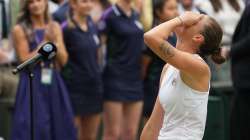Karolina Pliskova proud of effort to make Wimbledon final competitive
After a "horrible start", Pliskova regained her composure and recalibrated her shots enough to force a third set before losing the final 6-3, 6-7 (4), 6-3

It's never a good thing to lose the first 14 points of a Grand Slam final. At least Karolina Pliskova could laugh and smile about it afterward.
“Definitely horrible start," she said.
Fair.
Somehow, though, Pliskova regained her composure and recalibrated her shots enough to make a match of it and push No. 1-ranked Ash Barty to a third set before losing 6-3, 6-7 (4), 6-3 at Wimbledon on Saturday.
Pliskova's record in major finals dropped to 0-2 — she also came out on the short end at the 2016 U.S. Open — while Barty is now 2-0 after adding the championship at the All England Club to the one she collected at the 2019 French Open.
“Of course,” Pliskova acknowledged, “some nerves were there.”
It already was 3-0, love-30 for Barty before Pliskova managed to grab a single point. Soon enough, it was 4-0.
But Pliskova, a 29-year-old from the Czech Republic who has been ranked No. 1, spoke about being proud of her performance — because of the way she was able to hang in there and make things more interesting.
“You always have to believe that things can go your way, things can get better, which of course was not easy. Definitely not. It was a tough moment because I thought, like, I can just play much better than I did,” Pliskova said about the way things began. “I thought: If I can get, like, a game just to start, or a point to start — because actually I didn’t make a point the first three games — then it can be like much better.”
Here is what else was going through her mind in the early going: In the final of the clay-court tournament in Rome against 2020 French Open champion Iga Swiatek in May, Pliskova lost by a score of 6-0, 6-0.
Tapping her temple with her left index finger Saturday, she said: “I thought, ‘No, this is not be possible. This cannot happen again.’”
It did not. Because she started doing everything a bit better.
She had more success with her greatest asset, her serve. Her groundstrokes were suddenly smoother and on-target.
“Yeah, I just found a way," Pliskova said. "I think that’s the most important after match like this, that I always find a way — no matter how you feel, no matter how the opponent is playing.”
Pliskova is firmly in that group of female tennis players thought of as the best without a major trophy.
And she emphasized Saturday that she wants one and will strive for one and thinks she is only getting closer to one.
“This,” Pliskova said, “is going to be, always, my goal for now.”
Barty praised Pliskova, whom she referred to by her nickname of Kaja, as “an exceptional competitor” and said she is underestimated in that regard.
“She’s been a Top 10 player for a number of weeks now, one of the most consistent on the tour over the last, I don’t know how many years — five or 10 years. She’s always been there, always been knocking on the door, always giving herself the opportunity,” Barty said. “I know that Grand Slam title for her is not far away.”